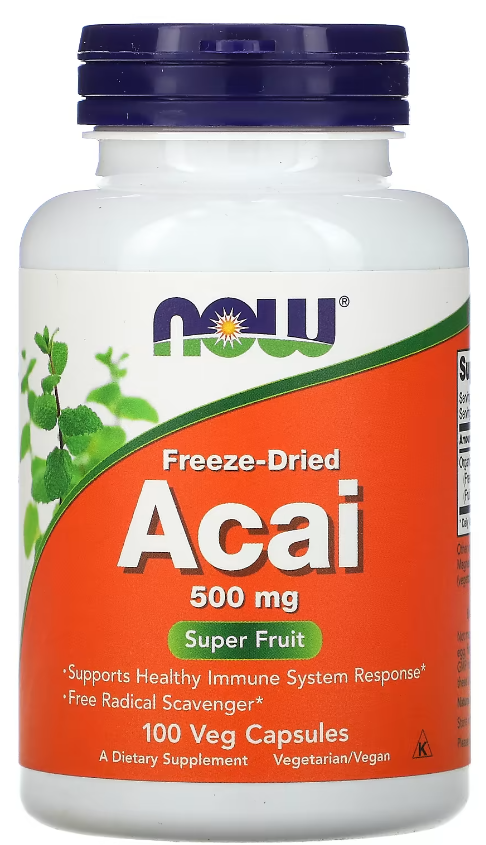Acai berry is regarded as a functional food and has attracted widespread attention from the international community for its nutritional value and therapeutic prospects.
Studies have found that acai berries have higher antioxidant capacity than other anthocyanin-rich fruits such as blueberries, blackberries, cranberries, etc. Note 5
What is Acai?
Acai berry is a plant in the palm family that is native to Central and South America, with the most abundant production in floodplains in the Amazon.
In addition to being an important food source for the inhabitants of the Western Amazon, this fruit is also used as a medicinal plant for fever, pain, inflammation and anemia, with antioxidant, anti-inflammatory and vasodilating effects.
Acai fruit is rich in anthocyanin compounds and other polyphenols such as epicatechins, catechin homogenization, ceramin, isolimoxine, deoxyhexose and other substances, giving it excellent nutritional value.
What are the proven benefits of acai?
1. Increase antioxidant capacity and reduce reactive oxygen damage
Oxygen is an indispensable element of life. When cells use oxygen to produce energy, free radicals are a byproduct of mitochondria producing ATP (adenosine triphosphate), also known as reactive oxygen species.
At low or moderate levels, reactive oxygen species exert beneficial effects on cellular response and immune function.
At high concentrations, they generate oxidative stress and cause oxidative damage to cells (lipids, proteins, DNA), eventually leading to many chronic diseases such as atherosclerosis, cancer, diabetes, rheumatoid arthritis, post-ischemic perfusion injury, myocardial infarction, cardiovascular disease, chronic inflammation, stroke, shock, aging and other degenerative diseases.
A study (4 weeks, 35 healthy women) showed that acai puree intake increased catalase activity, total antioxidant capacity, and reduced reactive oxygen species production. Note 1
In addition, it reduces the concentration of serum protein carbonyl and increases the total serum thihydryl group. (These two indicators are related to protein oxidative damage).
*Conclusion: Consuming acai berries helps to increase the body’s antioxidant capacity
2. Improve metabolic syndrome
Metabolic syndrome consists of a group of metabolic disorders characterized by obesity (with an emphasis on excess belly fat), high blood pressure, dyslipidemia, and hyperglycemia, and directly or indirectly increases the risk of coronary heart disease, atherosclerotic disease, and type 2 diabetes.
Once you have metabolic syndrome, the risk of type 5 diabetes increases fivefold and the risk of cardiovascular disease increases fivefold within 10 to 2 years.
An open-label study (1-month study of 10 overweight adults with a BMI between 25 and 30 kg/m²) found that acai puree consumption helped reduce fasting blood glucose, insulin levels, postprandial blood glucose rise, total cholesterol, and LDL cholesterol relative to baseline. Note 2
*Conclusion: Intake of acai puree has a positive effect on improving metabolic syndrome-related indicators, but limited by small samples, more placebo-controlled trials are still needed to further confirm
3. Reduce the risk of cardiovascular disease
Cardiovascular disease kills more than 1600 million people worldwide each year, accounting for about 30% of all deaths globally.
Many cardiovascular events can be avoided by improving risk factors, such as unhealthy diet, overweight and obesity due to lack of exercise, and smoking.
A randomized, double-blind controlled study (23 healthy men) noted that short-term acai consumption helped improve vascular function (measured by brachial artery vasodilation/FMD, but no significant improvement in blood pressure, heart rate, or postprandial glucose response). Note 3
*Conclusion: Acai intake is beneficial to vascular function and may reduce the risk of cardiovascular events, but more long-term studies are needed to confirm it
4. Beneficial non-alcoholic fatty liver disease
Nonalcoholic fatty liver disease (NAFLD) is defined as bullous steeatosis that occurs when alcohol intake is less than 20 grams per day.
It is the most common liver disease in the United States, ranging from the mildest form of steatosis to steatohepatitis (NASH) to progressive fibrosis and finally cirrhosis with portal hypertension.
The exact cause of nonalcoholic fatty liver disease is unknown, but it is strongly associated with obesity, metabolic/insulin resistance syndrome, and dyslipidaemia.
It is estimated that 70%-80% of obese patients have nonalcoholic fatty liver disease, of which 15%-20% have steatohepatitis.
An animal study has shown that eating acai berries can help improve nonalcoholic fatty liver disease, including reducing alanine transaminase, alkaline phosphatase, macrovesicular steatosis, and increasing antioxidant capacity. Note 4
*Conclusion: Animal studies have found that acai fruit intake may be beneficial for nonalcoholic fatty liver disease, but more human trials are needed to confirm this
Do acai have side effects?
Acai berries are a natural food, and so far there have been limited studies, and moderate intake has not had any side effects or adverse effects.
In the case of processed products, such as powders, juices, teas, smoothie tablets, etc., possible side effects include: bloating, bloating, nausea, constipation or diarrhea.
In South America, there have been cases of Chagas disease, a parasitic disease known as American trypanosomiasis, associated with poor sanitation that contaminates food.
Safety precautions (4 contraindications to use)
1. Acai berries are high in potassium. If you have kidney disease, you should follow a low-potassium diet and avoid it.
2. May have a hypoglycemic effect, so do not use it in combination with diabetes drugs
3. Do not use by pregnant or lactating women, because the relevant safety is unknown
4. May interfere with the action of chemotherapy drugs, so you should avoid using these drugs if you are taking them
Where can I buy the highest quality Acai that is recommended by most people?
| Super Fruit Supports Healthy Immune System Response Free Radical Scavenger A Dietary Supplement Vegetarian - Vegan Kosher Botanicals / Herbs Family Owned Since 1968 GMP Quality Assured NOW Acai delivers the natural nutrient profile found in Genuine Whole Foods. (Direct shipping from the United States / Worldwide delivery) |
Product Features: | |

